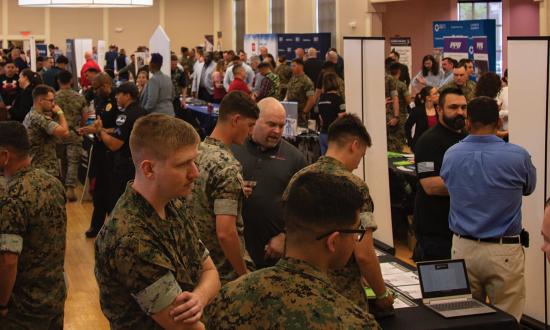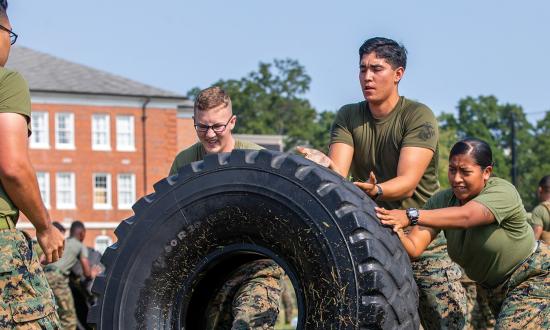Pushing brooms, taking out the trash, and not questioning orders from higher ranks. This is the life of undesignated sailors. Creative ideas are above their pay grade. But does a culture of conformity help sailors thrive, or is it time for the Navy to push for disruption?
Spirit of Innovation
War has been the driving force behind many innovative ideas, such as computers, radar, global positioning satellites, and more.1 The urgency of war made the military laser-focused on concrete issues during times of conflict, and the generation that experienced these situations kept that mindset, focusing less on abstract problems. If a system is proven successful, why risk changing it? However, this mindset encourages newer service members to conform to old systems rather than bringing forward new ideas—even in the face of an increasingly complex and changing world. In a November 2022 Proceedings article, General David H. Berger, Commandant of the Marine Corps, noted simply: “The military cannot rely on yesterday’s solutions to solve today’s or tomorrow’s problems.”2
Conformity Before Creativity
Conformity does not necessarily inhibit creativity.3 In other words, before the Navy can spark positive disruption, it is important first to understand the cultural norms and practices that allow the Sea Services to function properly. Naval traditions exist for a reason and connect service members with each other and those who came before.4 However, there must be a line drawn between conformity and evolution. Status quo bias has been running the Navy for decades.5 In a 2007 essay in Armed Forces Journal, retired Army Colonel Paul Yingling stated, “It is unreasonable to expect that an officer who spends 25 years conforming to institutional expectation will emerge as an innovator in his late forties.”6 Such mindsets lead to complacency and stagnation, a deadly combination.
For an organization to remain relevant, it must be built on a foundation of conformity while allowing space for growth and creativity. The more sailors understand the Navy’s core values, the more they can change the service for
the better.
The Private Sector
Successful business executives who served in the military, including Sam Walton (Walmart), Fred Smith (FedEx), Jack Taylor (Enterprise), Ken Hicks (Foot Locker), and Sam Shoen (U-Haul), prove that the armed forces have no problem recruiting men and women with great potential for leadership and a talent for devising disruptive ideas.7 The problem lies in retaining those individuals. In a culture of conformity, disruptive ideas are frequently ostracized, and those with a talent for them often end up in the private sector.
Furthermore, the private sector has embraced creative ideas for retention while the armed forces rely on bonuses and marketing themes that do not resonate as strongly with the current generation. Those who stay in the armed forces largely accept the status quo. While this has its place, it pushes sailors constantly to compete for qualifications, awards, and promotion—often leading to hostility rather than collaboration. It also develops sailors who are reluctant to put forward innovative ideas, lest their careers suffer for it.
Leadership
In my short time in the Navy, I have witnessed many senior enlisted sailors and commissioned officers use fear to keep more junior enlisted sailors in line. Fear-based leadership simply does not work in the long term, leading to the following problems: decreased cognitive ability; resentment; insecurity; fight or flight instincts; and disengagement from the team.8 The pressure put on these leaders to succeed makes them unapproachable with abstract issues, leading to poor management and loss of connection with subordinates.
However, it is not difficult to find new ways to look at leadership. As Army First Sergeant Bryant Gray stated in an interview on compassionate leadership, “You must be able to lead your soldiers and staff with the same care and compassion you would have with your own family.”9 Leading with fear is effective in the short term because it is quick, but it does not develop innovative, professional sailors who stay in the Navy.
Looking to the Future
Shared purpose, conformity, regulation, and uniformity are the foundation of military service, but retaining the best and brightest people beyond their initial terms of service will require a culture that encourages creativity, flexibility, and new ideas. The Navy need not look far for new ideas. Many sailors have the drive and desire to contribute to the Sea Services, but if the culture does not embrace them, they will take those ideas elsewhere.
1. RADM John W. Tammen, USN (Ret.), “NATO’s Warfighting Capstone Concept: Anticipating the Character of War,” NATO Review, 9 July 2021.
2. Gen David H. Berger, USMC, “Recruiting Requires Bold Changes,” U.S. Naval Institute Proceedings 148, no. 11 (November 2022).
3. Ella Miron-Spektor, Miriam Erez, and Eitan Naveh, “To Drive Creativity, Add Some Conformity,” Harvard Business Review 90, no. 3 (March 2012).
4. Kelsea Willenbrock, “The Value of Tradition,” Baylor Lariat, 28 November 2016.
5. Richard J. Zeckhauser and William Samuelson, “Status Quo Bias in Decision-Making,” Journal of Risk and Uncertainty 1, no. 1 (February 1988), 7–59.
6. COL Paul Yingling, USA (Ret), “A Failure in Generalship,” Armed Forces Journal, 1 May 2007.
7. James Rosebush, “Do Veterans Make Better Business Leaders and CEOs?” Real Leaders, 1 November 2021.
8. Andre L. Revell II, “Compassionate Leadership,” Army.mil, 18 June 2018.
9. Derek Gaunt, “Five Reasons Fear-Based Leadership Is Ineffective,” The Black Swan Group blog, 7 September 2020.







